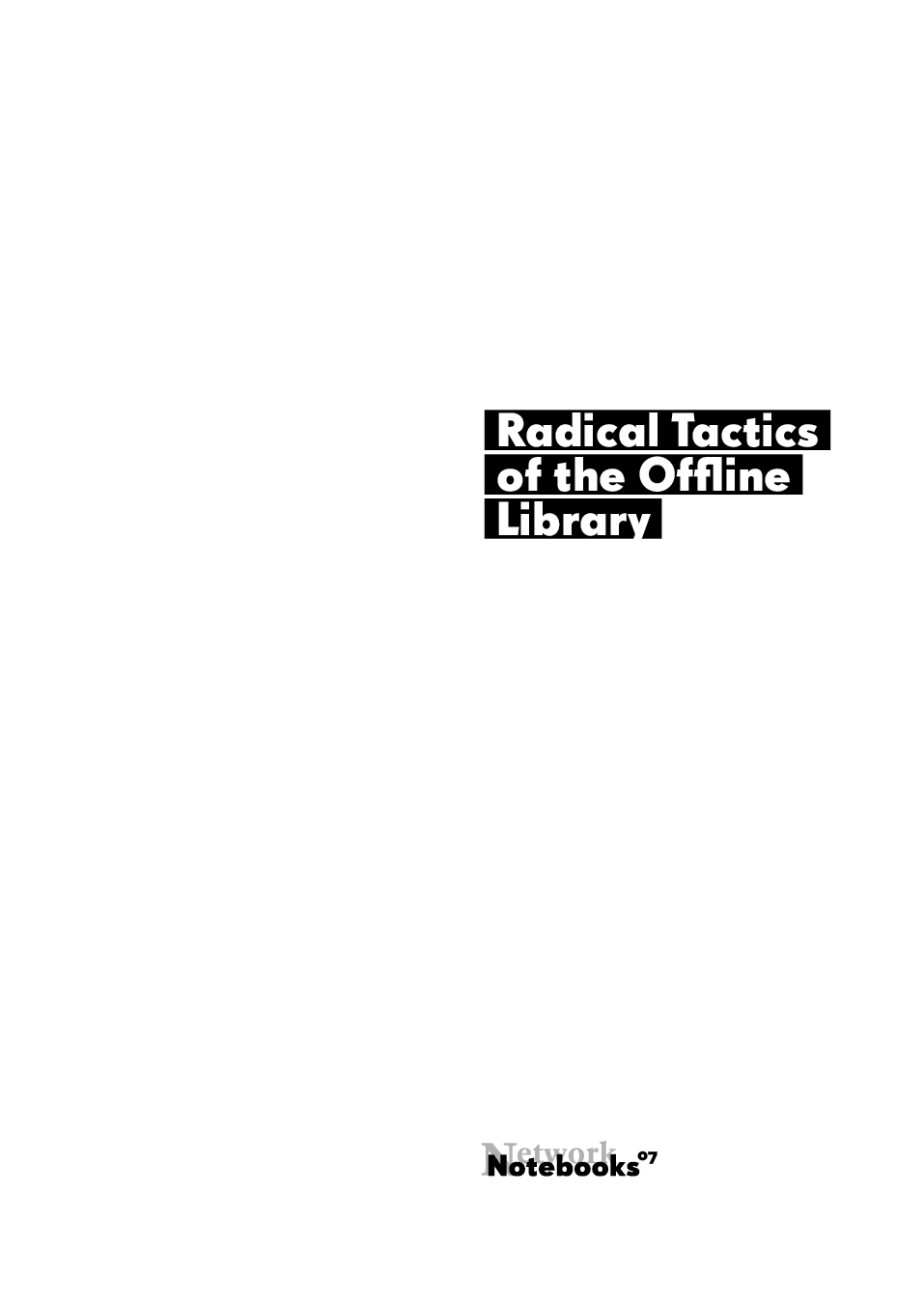Colophon
Network Notebooks editors: Geert Lovink and Miriam Rasch
Design: Medamo, Rotterdam www.medamo.nl
ePub development: Andr Castro
Printer: Printvisie
Publisher: Institute of Network Cultures, Amsterdam
Supported by: Amsterdam University of Applied Sciences (Hogeschool van Amsterdam), Amsterdam CreativeIndustries Publishing, Stichting Democratie en Media
If you want to order copies please contact:
Institute of Network Cultures
Hogeschool van Amsterdam
Rhijnspoorplein 1
1091 GC Amsterdam
The Netherlands
http://www.networkcultures.org
t: +31 (0)20 59 51 865
ePub and PDF editions of this publication are freely downloadable from:
http://www.networkcultures.org/publications
This publication is licensed under Creative Commons Attribution-NonCommercial-NoDerivs 3.0 Unported (CC BY-NC-ND 3.0) To view a copy of this license, visit creativecommons.org/licenses/by-nc-sa/3.0/.
Amsterdam, June 2014
ISBN 978-90-818575-9-8 (print)
ISBN 978-90-822345-0-3 (ePub)




Contents
Network Notebook Series
The Network Notebooks series presents new media research commissioned by the INC.
PREVIOUSLY PUBLISHED NETWORK NOTEBOOKS:
Network Notebooks 06
Andreas Treske, The Inner Life of Video Spheres: Theory for the YouTube Generation, 2013. ISBN: 978-90-818575-3-6.
Network Notebooks 05
Eric Kluitenberg, Legacies of Tactical Media, 2011. ISBN: 978-90-816021-8-1.
Network Notebooks 04
Rosa Menkman, The Glitch Momentum, 2011. ISBN: 978-90-816021-6-7.
Network Notebooks 03
Dymtri Kleiner, The Telekommunist Manifesto, 2010. ISBN: 978-90-816021-2-9.
Network Notebooks 02
Rob van Kranenburg, The Internet of Things, 2008. ISBN: 978-90-78146-06-3.
Network Notebooks 01
Rosalind Gill, Technobohemians of the New Cybertariat, 2007. ISBN: 978-90-78146-02-5.
The Personal Portable Library in its most simple form is a hard drive or USB stick containing a large collection of e-books, curated, archived and indexed by an individual user. The flourishing of the offline digital library is a response to the fact that truly private sharing of knowledge in the online realm is increasingly made impossible. While P2P sharing sites and online libraries with downloadable e-books are precarious, people are led to an atavistic and reversalist workaround. The radical tactics of the offline: abandoning the online for more secure offline transfer. Taking inspiration from ancient libraries as copying centers and Sneakernet, Henry Warwick describes the future of the library as digital and offline. Radical Tactics of the Offline Library traces the history of the library and the importance of the Personal Portable Library in sharing knowledge and resisting proprietarian forces.
The library in Alexandria contained about 500,000 scrolls; the Library of Congress, the largest library in the history of civilization, contains about 35 million publications. A digital version of it would fit on a 24 terabyte array, which can be purchased for about $2000. Obviously, most people dont need 35 million books. A small local library of 10,000 books could fit on a 64 GB thumb drive the size of a pack of chewing gum and costing perhaps $40. This is an astounding fact with immense implications. It is trivially simple to start collecting e-books, and then to share the results. And it is much less trivially important. Sharing is caring. Societies where people share, especially ideas, are societies that will naturally flourish.
Henry Warwick is an assistant professor at the RTA School of Media at Ryerson University, in Toronto, where he teaches media and communications theory and audio production. An artist and musician, much of his work can be accessed for free at kether.com. He likes to collect books and music and build libraries.
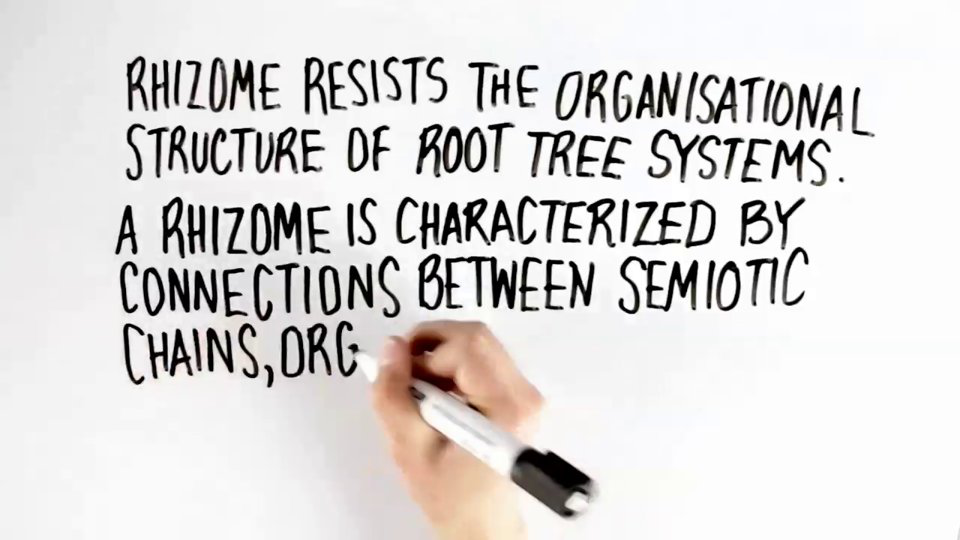
Watch The Radical Tactics of the Offline Library video on http://vimeo.com/95351775
This book is dedicated to the memory of Aaron Swartz.
Sharing isnt immoral its a moral imperative. Only those blinded by greed would refuse to let a friend make a copy.
Aaron Swartz (2008)
Never underestimate the bandwidth of a station wagon full of tapes hurtling down the highway.
Andrew S. Tanenbaum (1989)
Acknowledgments
I would first like to thank those people without whose help and dedication this work would simply not exist. First off, my friend, advisor, and all around compaero, Geert Lovink. You rock. Thank you, so much, for everything. I would also like to thank his able assistant and my editor, Miriam Rasch for her cheerful support and keen eye for detail and ideas regarding how to structure this book. Thanks Miriam!
I would like to thank Victor Vitanza for listening to and reading my ideas and his support as I developed this line of research. I would also like to thank my friend and colleague Greg Elmer for his keen perspectives and sharp observations over the past few years his guidance has been excellent and timely. I would like to thank my friend and former boss, Debbie Miller. She was the best from Macromedia to Apple to Napster, she collected me for some of the most exciting day jobs I've ever had. I would like to thank my high school friend, David Gresh, because he didn't want to work for his mom at the library, so I got his job shelving books. I would like to thank my wife, Beth Scannell, and my daughter, Elizabeth Warwick, for putting up with all my craziness. I love you both, so very very much.
I would like to thank Aaron Swartz, to whose memory this volume is dedicated you fought the good fight and you are deeply missed. And finally, I would especially like to thank those people presently running the publishing conglomerates books, music, movies, etc.; the captains of the cultural industry itself. Because without your incessant badgering, hectoring, and bottomless mindless lunatic greed, none of this would have ever been necessary.
Henry Warwick, May 2014
Its a Numbers Game
Never underestimate the bandwidth of a minivan full of multi-terabyte hard drives hurtling down the highway.
Henry Warwick (2012)
The Library of Congress contains about 35 million books. Some are longer than others, but each book would likely be less than one megabyte in size if it was reduced to a text file (.txt) on a computer. The math is simple: one byte = one typed alphabetic character. One page of text contains about 2,000 characters, so one million bytes, aka one megabyte (MB) would hold about 500 pages of text data. Most books are much less than 500 pages any visit to a library or bookstore will provide ample evidence of that. Still, the math is straightforward and powerful: 35 million books equal roughly 35 million MB, or 35 terabytes (TB). If the average length of a book is 350 pages, then the whole of the Library of Congress would fit in less space a 24 TB drive. If the average length is 250 pages, it would fit on an 18 TB drive with a little room to spare. It just so happens that one can purchase a 20 TB drive for about $2000 as of this writing. The costs of storage are expected to continually decrease over time. These numbers form a simple calculation of how to corral the entire book collection of the Library of Congress,

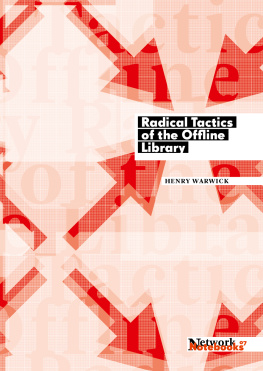

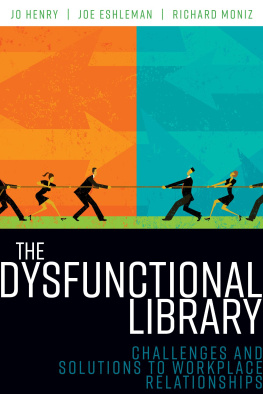

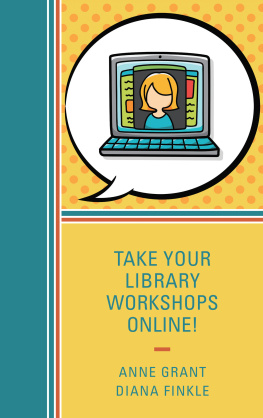
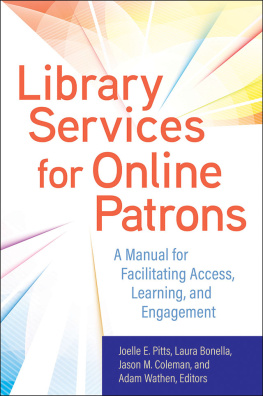



![Anita Anand - The Library Book. Anita Anand ... [Et Al.]](/uploads/posts/book/40194/thumbs/anita-anand-the-library-book-anita-anand-et.jpg)

